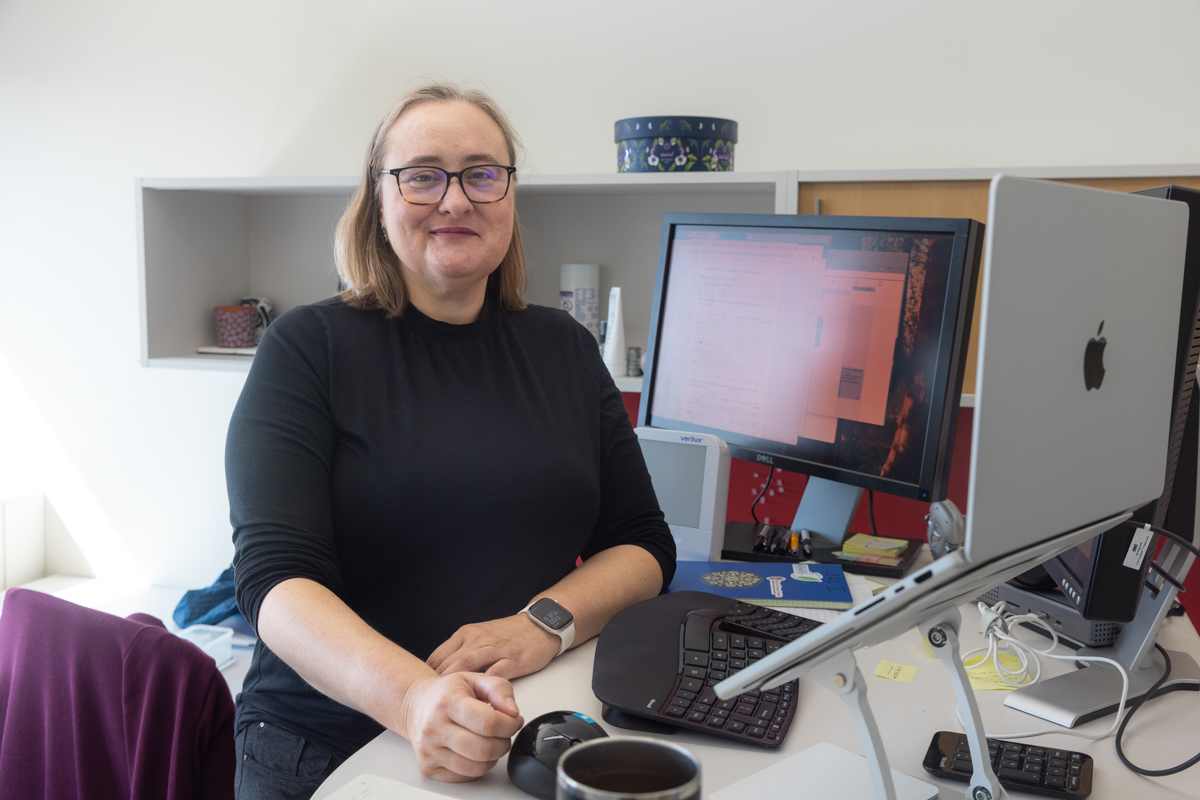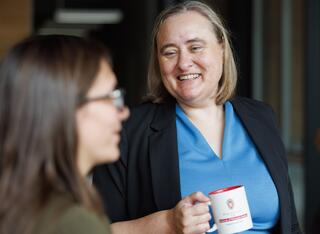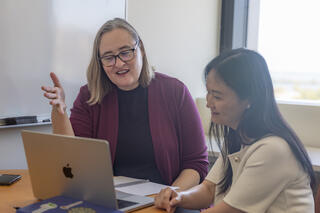
With a doctorate in biophysics and more than a decade of experience in career and professional development, Alexandra Schnoes is uniquely qualified for her new position as workforce development manager at the Great Lakes Bioenergy Research Center. We talked to her about her own career path and her vision for recruiting, retaining, and training the next generation of GLBRC scientists.
What do you like to be called?
Most people call me Alex in the professional world, just because it's shorter, but actually I like my name, so it doesn’t really matter.
What’s your role in the GLBRC?
I am the workforce development manager, which encompasses two main aspects. One is thinking about the pipeline of amazing scientists that are going into STEM and specifically might end up here. In terms of my day to day work that’s mostly thinking about postdoc recruiting for the center. The other part of my work is really supporting the research trainees that are here: helping them find professional development resources or career resources, knowing where to go on campus for things that they might need, being someone they can talk to one on one around career, professional, or mentor-mentee relationship issues.
What is your academic background?
I was born in Madison. I went to undergrad here (at UW–Madison). I majored in chemistry and computer science. Chemistry clicked with me, and it also just felt incredibly fundamental. But I realized I didn’t really love being in the wet lab, and I really loved working on computers. Then I went to a biophysics program at UC-San Francisco and did my doctorate there. I ended up doing bioinformatics research, which I enjoyed to a point, but I realized that that wasn’t the thing I really wanted to do long term.
How did you end up in professional development?
One of the things that kept me sane during grad school was working on student government. A roommate dragged me because they had free dinner at the meetings. I had never been a student government type. At this meeting, a whole bunch of campus issues were being brought to the graduate students to weigh in on, give feedback, and participate in what felt like meaningful ways, so I ended up showing up and continuing to do things. I was an officer for many years, and one of the things that I was really drawn to was trying to start events around career, professional development, mostly because I didn’t know what I wanted to do with my life, so I might as well build events around it.
When I was graduating there were still things I wanted to finish in the lab, but there was also an opportunity to start an internship program for grad students, and they were looking for a part-time program coordinator. So it was a 50/50 split. I did that for about three years, and I was still trying to figure out, do I want to do research? I got my dream postdoc position, and I just couldn’t figure out what I was going to use that postdoc for because I knew I didn’t want to do bioinformatics research long term. And the opportunity to transition to full time for the internship program was possible, and so I made the hard choice — that I have not regretted — of saying, all right, that kind of research is over for me. I’ve continued to do research, except on educational interventions — more social science research. So I haven’t really gotten away from the academic side, it just looks different.

Where has that career taken you?
I was in the UCSF academic system for seven years, and then I transitioned to the Science Communication Lab for about nine years. It used to be called iBiology, and its mission has always been around science education and science communication. UCSF is one of many institutions in the country that has the ability to bring amazing scientists from around the world to give seminar talks, but these are talks that someone in say Sub-Saharan Africa or rural China are never going to be able to see regardless of the fact that they’re studying science and they could gain something from it. (UCSF biochemist Ron Vale) thought, well, that's kind of dumb. When people come here to give seminars, why don't I film them in front of a green screen talking about their research, and then we can put it on the web for free and so everyone can access it. But they were interested in doing more. They got an NIH grant to build online courses and resources around career and professional development for scientists. The shorthand was “how to do good science” courses.
I think communication is incredibly important, and digital media was an interest I was exploring on my own. They were looking for someone who could produce these courses and had all of the career and professional development skills. They were willing to take a chance on me with my more limited digital media experience. And, gosh, it was a lot of fun.
What drew you to the GLBRC?
For me, it’s twofold. I’ve always been interested in trying to work on climate, but that’s not my scientific background, so I never really thought that I would have the opportunity to work on projects that would be this aligned and this supportive of that mission. I really enjoy doing career professional development work. I really enjoy supporting trainees. I am really committed to trying to support and improve the academic research environment, and so this role really allows me to do all of that. To have an opportunity come up that literally needed my exact skills, that was unexpected and a really nice surprise.
How has your scientific training helped you in this career?
One of the biggest things is understanding the environment — how a lot of research training is done and aspects of the hidden curriculum, the expectations and norms that are unspoken but critical to understand if you want to be an accepted member of the community. Like, do you know that when you’re a grad student in science that you don't get summers off? You’ve gone to school all of these years and you have summer vacation, but all of that ends when you go to grad school. And I’ve had people tell me they didn’t realize that was a thing. If no one’s told you, how would you know things like what’s expected of you in terms of how long you’re supposed to be spending in the lab? You are just expected to know.
A lot of the work that I have done, especially more recently, has been really trying to make that implicit explicit. What does it mean to be a good scientist? One of the courses we built was on how to give good research talks. This is another aspect of the hidden curriculum. My mentors never sat me down and said, this is what a good talk looks like. You are just expected to sit in that room watching people talk and just absorb the good stuff and not the bad stuff.

What’s your vision for professional development and recruitment at GLBRC?
My dream would be that I could talk to everyone in the center for at least 15 minutes and just hear what they had to say. Everyone is full of these really amazing ideas of ways that we could recruit postdocs or elevate the trainees here, or elevate knowledge about the center. GLBRC is unique. It’s a large center, multiple locations, but because of the way that it's organized and the fact that it has this sort of structure, it's incredibly collaborative. It has real, defined projects. You’re not a lone grad student wandering off in the wilderness. There are not many programs that are this large, with this many resources, and this many amazing scientists. But on the other hand, it's also not really well known in some ways.
What do you do in your spare time?
I have been a long time yogi — or, I guess, yogini — but I haven’t gone to any classes in Madison yet. I do online yoga these days, and would love some local recommendations. I’m a big fan of being outside in any way, shape or form, particularly hiking or walking. My two favorite places are Governor Dodge and Governor Nelson State Parks. I play weekly board games online with friends back in San Francisco. We started during the pandemic and still do it almost every weekend. If anyone else at GLBRC is a board gamer, it would be great to play.
What’s something about you that might surprise people?
Something that's unique about me that has, I think, definitely shaped the way I see the world and how I value family and friends, is that both of my parents are immigrants. My mom’s from Ukraine. My dad’s from Germany.
What’s something that you wish you had known at the start of your career?
First, try to make active choices about what you’re doing in your career. I mean, yes, sometimes you need a paycheck. But don't just default anymore. Be conscious of what you are doing and why. The other thing I wish I knew is that you are probably more capable than you give yourself credit for. When I got out of grad school and I started working on projects that were shorter and much better defined, I felt like a competent human being again. What can happen to some people at the end of training is you forget how much you’ve accomplished, because it’s been so hard to get there and you’re so tired at the end of it.